#terms and terminology
Text
What's the thing... When you try to make art a perfect almost photorealistic copy (w/o tracing)? Not trompe l'oeil but that other thing. Am I just thinking of a study? I feel like there's another word I'm missing but can't remember.
4 notes
·
View notes
Text
to whoever needs to hear this: transvestite and transsexual are not slurs. "outdated" queer terms are not inherently slurs. these are literally historically the first 2 terms created and used to talk about the trans community, both coined the first doctor to perform successful trans sex reassignment surgeries, who spent the rest of his career pioneering and paving the way for the modern surgeries we perform today. his name was Magnus Hirschfeld, he was a jewish doctor who began a lifetime of fighting for queer rights due to being moved by the struggles his queer patients went through in terms of not being allowed to accept themselves during the Nazi regime at the time. these are perfectly fine terms that have grown to develop their own distinct meanings and communities over time. this man spent his life fighting for trans and jewish rights during Nazi occupation. any queer term can be used as a slur in the wrong hands. thank you
#trans#transgender#lgbtqia#lgbtq#lgbt#queer#transsexual#transvestite#trans man#trans men#trans woman#trans women#transfem#transfemme#transfeminine#transmasculine#transmasc#ftm#mtf#genderqueer#nonbinary#non binary#genderfluid#our writing#queer history#magnus hirschfeld#queer terminology#queer terms#trans terms#trans terminology
2K notes
·
View notes
Text
So, I'm a panromantic asexual, right? And that's a lot of syllables. I could use the short forms instead.
So, I'm a pan ace, right? And that's a lot easier to say, but it's not as cool as it could be. There's a word that already exists, though, that sounds kinda similar, and it works because of the aces and cake thing.
So, I propose this: I'm a pancake.
#lgbtqia#queer community#panromantic#asexual#terminology#identity#please let this be the impact i have on the world#making this an actual term we use
2K notes
·
View notes
Text
We are doing a series on real estate terms and terminology. As our first term of this series we have picked REALTOR :
Who is a Realtor?
A real estate broker who is a member of a local board of REALTORS and is affiliated with the State Association (Florida Realtors) and the National Association of Realtors.
The Term is not synonymous with “real estate agent.”
We use the titles “realtor” and “real estate agent” interchangeably, but technically they refer to different things.
A real estate agent is a licensed professional who helps people buy and sell homes. A REALTOR is a licensed professional who is also a member of NAR the National Association of REALTORS.
Realtors are also held to a higher standard. They have to complete several different classes like the Ethics class.
For more content like this follow and hit the thumbs up button.
Have a wonderful day!
🎓📚🎓📚🎓📚🎓📚🎓📚🎓📚🎓📚🎓📚🎓
.
http://www.TheSirLancelotGroup.com
.
#realty #realestate #broker #forsale #newhome #househunting #property #daytonabeach #ormondbeach #portorange #properties #investment #family #home #housing #selling #listing #sirlancelottherealtor #realestateagent #Florida #certified #house #thesirlancelotgroup #newseries #terms #terminology #realtor #watchformore #liketime #fallow
#series#terms and terminology#realestate#realtor#realestateagent#lancelotrealtor#sirlancelottherealtor#thesirlancelotgroup#broker#florida#portorange#daytonabeach#ormondbeach
0 notes
Text
So. Stolas is an alcoholic. That much is very clear at this point in the show and has been for a while now. He binge-drinks to cope with depression and with his life problems at large.
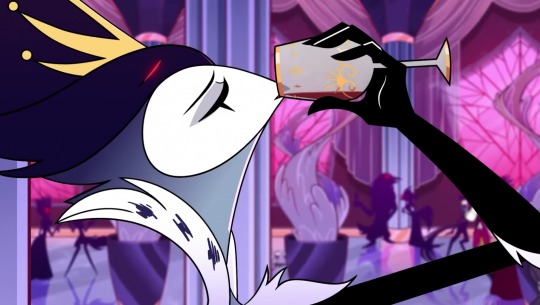
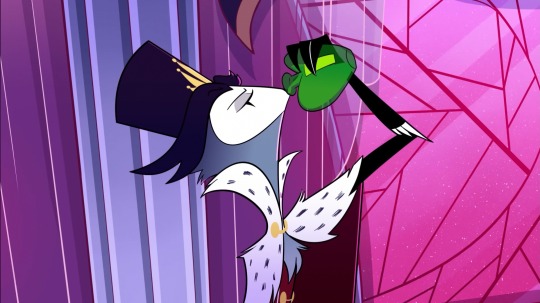
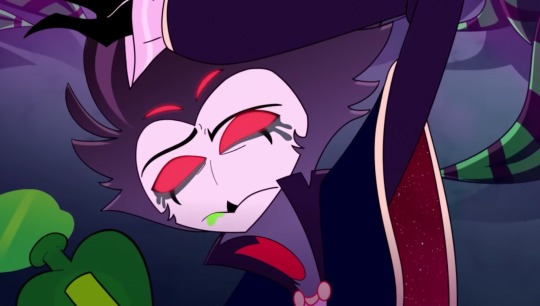
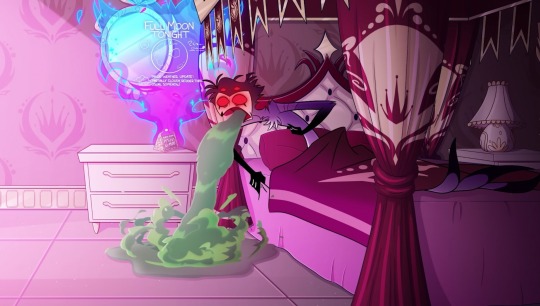
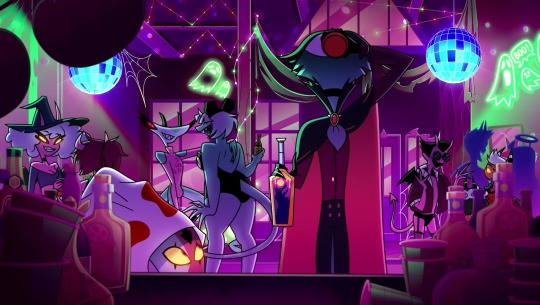

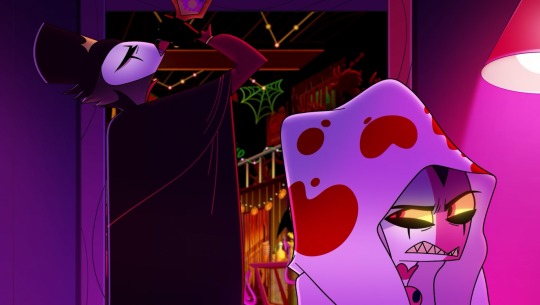
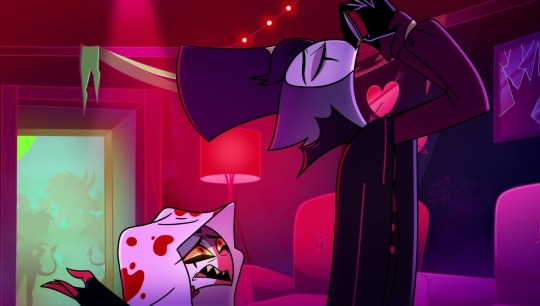
What's interesting is that he's far from the only character in Blitzø's life who is an alcoholic. In fact, substance abuse seems to be a recurring theme in the show. At least three other people Blitzø was or is really close with (potentially four, if we count his father) have struggled with substance abuse: Verosika, Barbie, and Fizz.
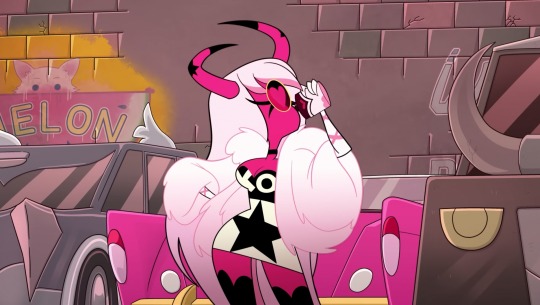
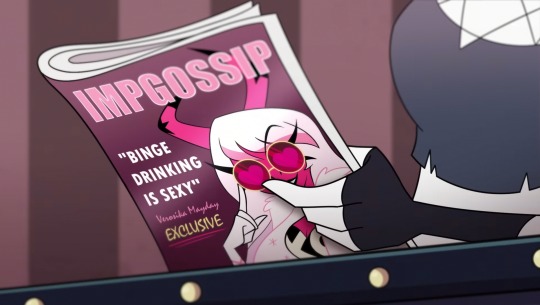
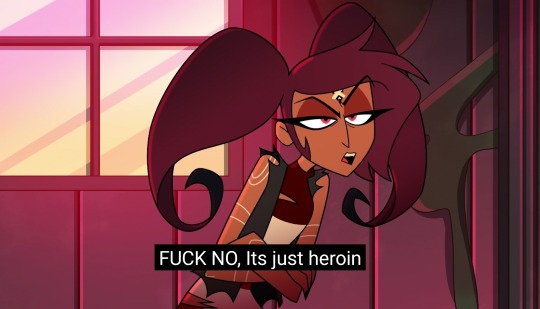
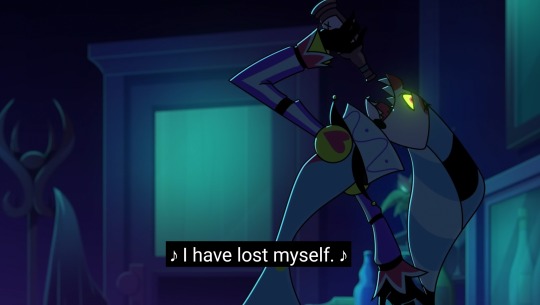
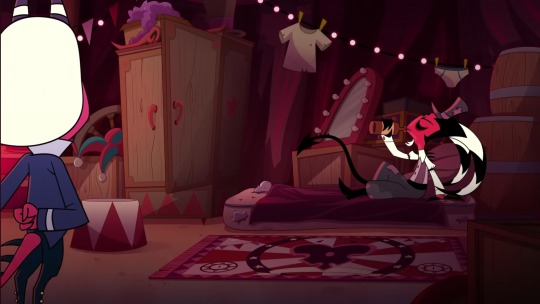
And the show has made a very clear point that both Verosika and Barbie have been in rehab. Not just that, but it's also emphasised that they're both still struggling with addiction (Verosika still drinks at her concerts, "clutches onto Beelzejuice bottles like they're the last cock in hell", and writes magazine articles about binge drinking being sexy; Barbie still peddles heroine, though not H8). Clearly, for both of them, this is an ongoing issue presently in the show.
So, with all of that being said, I recently saw someone theorise that, in a future season, Stolas is going to go to rehab, too.
I thought it was certainly a possibility, and one that I would personally love to see explored. So I've been thinking about it... and I remembered this:
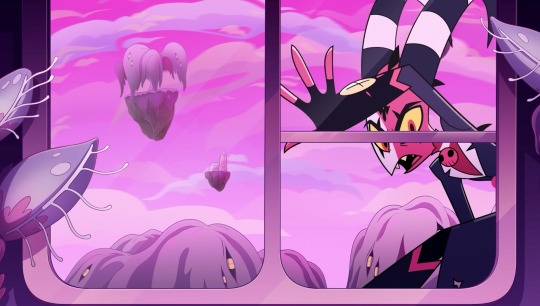
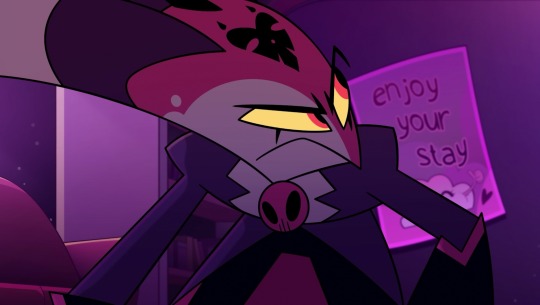
The beginning of Unhappy Campers, and Blitzø breaking into rehab to go visit Barbie.
Now, I think a lot of people (myself included) felt surprised and a bit disappointed the first time we watched this episode, because our initial assumption was that Blitzø was trying to visit Stolas. It just made sense! Stolas was hospitalised right at the end of the previous episode and texted Blitzø that he could visit if he wanted to. (At this point, we also didn't know Blitzø had trauma surrounding visiting loved ones at hospitals). And suddenly they hit us with Blitzø seeking out Barbie out of the blue? So many of us were left wondering... why? Yeah, people have mentioned that maybe feeling like he could've lost Stolas prompted Blitzø to try to mend a different broken relationship, one that he felt he had more chances of fixing. But the timing, as well as the non-immediate revelation that it's Barbie he's looking for, is still... strikingly suspicious, isn't it?
And just now, after all this time, it hit me.
What if this is foreshadowing?
What if, all along, they were telling us Blitzø will visit Stolas at the hospital in the future... when Stolas is in rehab?
#helluva boss#helluva boss spoilers#helluva boss apology tour#apology tour spoilers#helluva boss stolas#stolas#stolas goetia#stolitz#helluva boss verosika#verosika helluva boss#stolas helluva boss#barbie wire helluva boss#helluva boss barbie wire#alcohol tw#alcoholism tw#substance abuse tw#vomit tw#rehab tw#image description in alt#I'm not 100% aware of the correct terminology in English so please do tell me if I used any terms incorrectly
857 notes
·
View notes
Text
more literary terms
Asyndeton: The omission of a conjunction from a list ('chips, beans, peas, vinegar, salt, pepper').
Elision: The omission of one or more letters or syllables from a word. This is usually marked by an apostrophe: as in 'he's going to the shops'.
Feminine Rhyme: a rhyme of two syllables in which the final syllable is unstressed ('mother | brother'). If an iambic pentameter ends in a feminine rhyme the last, unstressed, syllable is usually not counted as one of the ten syllables in the line ('To be or not to be, that is the question' - the 'ion' is unstressed and takes the line into an eleventh syllable). Feminine rhyme can be used for comic effect, as it is frequently in the works of Byron: 'I've spent my life, both interest and principle, | And think not what I thought, my soul invincible.' It can also be sometimes used to suggest a feminine subject-matter, as in Shakespeare's Sonnet 20, which is addressed to the 'master mistress of my passion' and which makes extensive use of 'feminine' rhymes.
Polysyndeton: The use of multiple conjunctions, usually where they are not strictly necessary ('chips and beans and fish and egg and peas and vinegar and tomato sauce').
Topos: from a Greek word meaning 'place', a 'topos' in poetry is a 'commonplace', a standard way of describing a particular subject. Describing a person's physical features from head to toe (or somewhere in between) is, for example, a standard topos of medieval and Renaissance poetry.
If these writing notes helped with your poem/story, please tag me. Or leave a link in the replies. I'd love to read them!
Literary Terms pt. 1
#writing prompt#writeblr#writers on tumblr#poets on tumblr#literature#poetry#literary terms#writing inspiration#words#writing reference#writing resources#writing notes#terminology#been overusing asyndeton and polysyndeton in my writings for years#langblr#studyblr#dark academia
103 notes
·
View notes
Text
Proposing some intersex gender modality & transition terms
So there are a whole bunch of different ways that intersex people can be/identify as trans. I've been thinking about what names would be useful for articulating these differences and in this post I'll list what I've got so far. 🧑🔬
I'm hoping to get feedback on these, so if you have feedback let me know! 💛 I expect to edit this post, to incorporate feedback and further ideas.
CW: mention of IGM and forced HRT
Types of transitions
Distransition: a medical transition forced upon an intersex person, such as through IGM or forced HRT. Dis- to indicate the negative aspect of the transition being coercive, as well as to connote disability since this process is so frequently traumatic and/or disability-causing. In disability studies language it's a form of debility (disability caused through systemic violence).
Mistransition: a distransition (forced transition) that is not in alignment with a person's gender identity. Mis- to indicate the incorrectness of the alignment as well as to maintain a negative connotation because this is a coercive transition.
Entransition: a consensual transition done by an intersex person. Contrast to distransition. En- acts as an opposite to dis- and also to me indicates a level of intent (e.g. envision, enact, enliven). It also serves to indicate that transition is different for intersex bodies than for perisex bodies.
Retransition: an entransition done by an intersex person who previously had been distransitioned. I.e. when an intersex person does a second transition to undo, alter, or improve a forced transition. Re- to indicate a second transition, but also that it's a revision of the first one. EDIT #1: This term is not intersex exclusive, and may also be used by perisex trans people who have transitioned multiple times. EDIT #2: For an intersex-exclusive version, I suggest "re-entransition", combining re- and en-.
Retrotransition: a retransition that is done to undo the effects of forced transition. So an intersex person who, after being forced into a binary gender, then transitions their body towards a best approximation of what their body's natural state would have been without forced transition. Retro- for backwards to indicate undoing that is worth differentiating from detransitioning.
Laterotransition: a retransition done by an intersex person to a gender that is neither the gender externally imposed by a distransition nor what their body's "natural state" would be. For example, an AFAB AIS person who was coercively transitioned female, who then later transitioned male. Latero- as contrast to retro- (latero- is to the side, antero- is forward) as well as to indicate the turn away from the path set forth externally by parents/doctors.
Anterotransition: a retransition done by an intersex person that continues the direction set forth by previous forced transition. So additional transitioning done by somebody whose gender is in alignment with what was externally imposed. While this will probably be somebody's AGAB, it doesn't have to be - some times intersex people are forcibly transitioned to a different gender than their AGAB.
All of these transitions would have an analogous gender modality. So an entransgender person is somebody who has/is undergoing/intends to entransition. And a retrotransgender person likewise has/is undergoing/intends to retrotransition.
I see distransition and mistransition as potentially useful for intersex people talking about trauma and structural intersexism. I think entransition might be useful for talking about how being intersex and transitioning is frequently different than for perisex people, especially if it is a retransition. And perhaps distransition and anterotransition may be of use to exparium folks.
Personally: I was distransitioned as an adolescent and have recently started a process of medically retrotransitioning.
Feedback welcome! A list of revisions will go at the bottom of this post. Will make flags for terms once I feel satisfied with them.
Edits
2024-01-16: I've been informed by @chipbutbetter that retrans is already used by some perisex folks with complicated transition patterns, so I have edited to say this term should not be intersex exclusive. Thanks! 🏳️⚧️
2024-01-16: thought about an intersex-specific version of retransition and landed on "re-entransition". A little awkward but combines both retransition and entransition! Flexible on whether to include a hyphen (reentransition).
#intersex#intersex terminology#mogai#new mogai term#mogai requests#mogai coining#mogai review#cw: IGM#cw: forced transition#cw: forced hrt#tw: IGM#mogai peer review#actuallyintersex#actually intersex
333 notes
·
View notes
Text
i think everyone is entitled to their opinions. so as long as nobody's being a dick to the cast or other fans, then you can feel however you wanna feel about the episode
having said that, i think there's a disconnect in how the fandom thinks of the crown keepers and how the cast does
the amount of times i've seen the crown keepers be called "the spinoff" or "the side quest" or just straight up "filler episode" tells me that a lot of people don't think these guys are a part of this story
but they are. they have been since the start. they're very much intertwined with bells hells and the events of c3. heck, they have more connections to the gods than our group does. so you know they're gonna play a big role in the upcoming arc and final battle
#idk if there's a point to this post#just ramblings#i've been thinking a lot about the terms “main cast” and how that makes the cast of any other show inherently inferior#cuz they're not the main cast#and how the audience reacts to anyone other than the main cast#and how d20 also had similar terminologies but have since moved away from it#won't be surprised if cr does too after c3#critical role#cr spoilers#exandria unlimited#cr discourse
117 notes
·
View notes
Text
this website is cool bc a trans woman can put together the most well thought out explainer of transfeminist theory that covers basically every imaginable base in grave detail and then the very first response will be a tme person who has very obviously not absorbed any of the information on the page demanding the op invent yet another new term for transmisogyny bc they like the word and would like to keep it for themselves actually
#.jtxt#“what term are they claiming this time” it doesn't matter it could literally be anything.#but literally it was transmisogyny . like the most base terminology isn't even allowed to be definitive of our experience
62 notes
·
View notes
Text
To add on to slang/social norms Noir misses out on is the term ‘punk’. In the 1930s and WW2, ‘punk’ was a term used kinda similarly to how twink used to be used, but typically a lot more derogatory. Point is Noir hears someone call Hobie spider-punk or refer to the spider band as a bunch of punks once and he blue screens/starts throwing shit.
#it’s crazy how terms and slang has changed over time#like I’m sure this is not the only one that would immediately come up#there is def more#slur reclamation and the history of queer terminology is wicked interesting#I made a slide show in highschool#spider noir#spider band#ITSV#ATSV#Hobie brown#spider punk#spiderman
553 notes
·
View notes
Text

[Text: This system has alters who no longer identify with being a fictive for a variety of reasons.]
Like/Reblog if you save/use!
#userbox#did#system#did system#osdd1#osdd1 system#anti endo#endos dni#fictive#preferred terminology#preferred terms#boundary#boundaries#mod morpho 🦋
194 notes
·
View notes
Text
also: I mostly switched over from saying "antipsychiatry" to psych abolition after I started to see more groups like CPA use it, and thought I'd share some of my thoughts on it.
antipsychiatry is a fundamental part of psych abolition for me, but i think my definition of psych abolition contains a lot more. first, there's a lot more things than just psychiatry that i want to abolish and transform--the whole mental health system and many different belief systems, types of providers, forms of treatment, and types of incarceration that are encompassed in that. i think it's important to name and identify the particular harms of psychiatry as a value system in the way it is the strictest example of pathologizing, medicalizing, and the strongest adherer to the purely biomedical model of illness and how this creates so much harm. but i think that there are also so many other harmful structures + belief systems within the whole mental health system. i also sometimes see therapists, for example, portraying themselves as alternatives to psychiatry, and while that's true in the sense that they are a different treatment option than a psychiatrist, they are often still harmful actors in their own rights and entangled with the state in an equally bad way.
second thing for me is that i think it's really important to intentionally build cross movement solidarity, especially with the prison abolition movement and to expand the way psych survivors currently support support people fighting for abolition of all forms of incarceration. (i drew inspiration from sins invalid and the 10 principles of Disability Justice). I see so many people in psych survivor spaces saying " I can't believe we were treated like prisoners on the ward" with the implication that it's fine if prisoners are treated that way, but it's bad when it happens to them. i think that's fucked up and i think that any psych survivor movement that doesn't actively support people incarcerated in prisons is a movement that does nothing to dismantle white supremacy. we need to be able to recognize the ways carceral logics operate in many different structures, and approach our activism as a shared struggle, where we constantly are led by those most impacted. so i think that naming what we're doing as "abolition" is important (with the important caveat that our organizing must then actually be abolitionist, and especially for white organizers, that we need to learn about the history of abolition, actively support the Black leaders and thinkers who have created the prison abolition movement and not center ourselves, that we actually have to be actively involved in supporting abolitionist work happening in your area, instead of just stealing the work of Black abolitionist scholars to use it for our own benefit without any credit or reciprocity, that we need to actively interrogate ways white supremacy culture and antiblackness are showing up in our movement places so that we aren't inviting our comrades who are people of color into spaces that are not safe for them, or exploiting our comrades of color by expecting them to do the work of dismantling the racism within our shared organizing spaces--don't call yourself a psych abolitionist if you still call the cops on your homeless neighbors, if your solutions to psych incarceration contribute to gentrification, if you refuse to support currently incarcerated comrades, for example.)
third thing is that antipsychiatry as a specific term is often associated with the sociologist theory from the 1960s, some of which i think is useful, some of which comes from antisemetic and racist psychiatrists who should not be given any legitimacy. antipsychiatry also often gets associated with cults like scientology. although i think that scientologists bastardize a lot of antipsychiatry stuff and weaponize it for their own ends, a lot of the public thinks of them if you say antipsychiatry, and it can cause misconceptions. also think that people sometimes assume antipsychiatry is inherently against medication and while i don't think that's our responsibility to clear up every time people misread our words on purpose, i think it's been a lot more helpful for me to talk about medication in the context of autonomy, harm reduction, war on drugs, and the ways that psychiatry creates issues to consent, autonomy, informed use, risk reduction, etc etc etc. and i think psych abolition helps me do that a little better.
i get in a lot of conversations with people who say "well from what i've seen you are just against institutionalization. why not just say that instead of attacking psychiatry?" and my answer is always if we want to end institutionalization, we have to end the structures, belief systems, and power dynamics of psychiatry--psychiatry is one of the logics that enables institutionalization to continue, and abolishing institutionalization without abolishing the structures that allow it to continue mean that it just pops up again in a new form with a new name (asylums to hospitals to group homes etc etc etc). so i think psych abolition to me is a clearer way to encompass the ways that all these systems are interconnected, and that when we're fighting for mad liberation, the right for mad/neurodivergent/mentally ill people to access care, support, healing on our own terms, to be free from institutionalization and violent treatment, and have the right to exist as mad people, whether or not we're "cured."
TL;DR: I switched to saying "psych abolition" rather than antipsychiatry even though there are many core ideas of antipsychiatry that I agree with. I think that for me, psych abolition helps clear up some misconceptions that people have about antipsychiatry, more clearly connects to prison abolition, and makes it clear that we need to transform more of the mental health system than just psychiatry.
#personal#psych abolition#antipsychiaty#psych survivor#surviving psych#mad liberation#mad pride#this is mostly just a ramble of some stuff i've been thinking on lately. terminology is not the most important thing to me#and as always i feel like what terms are the ones that are the most accessible to ppl given their own context#like i am not a huge fan of going up to people and saying YOU NEED TO STOP SAYING THIS BC I SAID so#i guess for me i've been really interested lately in seeing the growing psych abolition movement#and sort of the current era of psych survivior/mad lib activism. the ways its been growing and changing in the current decade
169 notes
·
View notes
Text
The beginner autistic guide to common terms in our community (with extra context!).
*Disclaimer, I’m not a professional. This is just knowledge from my experience as an autistic person. Please feel free to correct anything :)
These definitions will include some of my own opinions and thoughts, especially on the more controversial terms. This is simply to help better prepare new autistic community members for conversations they become engaged in. Having all the perspective and context you can have can be very helpful when moving into new social spaces.
Autism (Or Autistic Spectrum Disorder, ASD): A neurodevelopmental disorder that is present from very early childhood. It’s mostly recognised through difficulties with social interaction and restricted and/or repetitive behaviours. The way it is referred to as “Autism Spectrum Disorder” is specifically referring to the fact that autism presents in countless ways. There are common traits and patterns, but the severity and complexity of those traits and symptoms is infinite.
NOTE: This does not mean that ‘everyone is a little bit autistic’. You are either autistic or you are not. It just means that if you have autism, it may present very differently to other autistic people you know.
Asperger’s Syndrome: Asperger’s syndrome is usually considered an older term for a ‘subtype’ of autism. The term is considered outdated by the DSM-5 and no longer used in that document. However it is still used in a lot of other countries. Now it is becoming more socially known that ‘Asperger’s syndrome’ is just a specific presentation of autism. Many autistics don’t like the use of the word ‘Asperger’s’ because of a couple reasons:
The term has a long history with NAZI’s and eugenics.
The term seems to basically mean ‘high functioning’ autistic, which simplifies the condition.
Asperger’s Syndrome is defined in a very similar way to autism, however people with “Asperger’s’ may be described as ‘gifted’ or ‘intellectual’.
It’s important to note that many people still identify themselves with the term ‘Asperger’s’. While it is good to be educated and up to date with terminology, some people have identified with this term their whole life and it’s not wrong to use the term for one-self. But either way, I do encourage you to do more research if you are comfortable.
Neurotype: Can be basically defined as the type of brain function one has. Some people consider autism a neurotype, and then neurotypical as another neurotype. However, many people claim that autism is ‘just another neurotype’. This is a harmful way of thinking about autism because autism is a disability. Labelling it as a ‘neurotype’ belittles all the struggles autistic people have that make them disabled. Autism is a spectrum and so some autistic people may not really consider themselves disabled, but many do.
Neurotypical (NT): A non-autistic person with no other mental conditions.
Allistic: A non-autistic person who can still have other mental conditions, such as depression or ADHD.
Neurodivergent (ND): Traditionally ‘Neurodivergent’ has been used to mean either autistic or ADHD. However in some contexts it is used to mean someone with any mental condition, including personality disorders or mental illnesses such as depression and anxiety.
Neurodiversity: a term used to describe the fact that there are many neurotypes in the world. It is used to imply that differences in brain development and function should be accepted as relatively normal. I think this is a good sentiment, but that some neurotypes should still be considered disabilities as well as a neurotype, so as not to diminish the struggles specific neurotypes go through.
High functioning/Low functioning: The labels of functioning are terms used to describe how independent an autistic (or other kind of disabled) person is able to be. Many autistics do NOT like the use of these terms for a couple reasons:
It tends to focus on the way an autistics disability affects the allistic people around them.
It simplifies the experience of the individual with autism to how independent they are, and is also not very descriptive for anyone trying to help the said autistic person.
High needs/Low needs: These are labels used to describe how much assistance an autistic (or other kind of disabled) person may need. It is slightly preferred by autistic people as the language is more centred to what the autistic person needs, rather than how independent they can be.
NOTE, many autistic people would argue that these terms are basically the same as high functioning and low functioning. I personally consider it to be best to just state someones highest needs or difficulties. For example “Olivia is nonverbal and highly sensitive to light and noise.”.
Masking: Masking is the act of hiding ones autistic traits to appear to be neurotypical. Masking is often a survival strategy developed by autistics to evade bullying or isolation. Masking can include suppressing the urge to stim, forcing oneself to make eye contact, learning how to ‘properly’ execute facial expressions, studying body language, etc. Masking can be an extremely vital skill for autistic people, but when an autistic person has to mask for long periods of time it can lead to negative consequences such as burn out or meltdowns. Masking can also be used in the context of other disabilities, such as ADHD.
Scripting: Scripting is a form of masking, when an autistic person pre-plans or practices responses or entire conversations. You may have a script you unconsciously follow for questions like “how are you?” Or “how is work?”, etc. It may be inspired from TV shows, movies or observing other people interact.
Burn out: Burn out is when an autistic person reaches their limit and has decreased energy for an extended period of time. Burn out may last anywhere between a couple days or a few years. Burn out is often caused by excessive masking, but can also be caused by repeated rejection, bullying or other mental conditions. Burn out is not the same as depression, but it can co-exist with depression.
Meltdown: A meltdown is when an autistic person experiences what might look like a ‘tantrum’. The person may be very angry, yelling, punching or hitting things (or themselves). They may be aggressively stimming or humming to themselves. A meltdown, internally, feels as if you are completely filled with negative energy, as if you might burst. It can feel like extreme irritation, or anger, or shame. Meltdowns can be caused by any number of stressful situations. For an autistic person this can be having a lot of social events, their routine being disrupted, having to eat foods they don’t like, being overstimulated, or even just negative social interactions.
Shutdown: A shutdown is very similar to a meltdown, in how it can be caused. For me personally, I tend to have a shutdown if I am not in a safe place to have a meltdown. From the outside it looks very similar to dissociation, and it can co-exist with dissociation. It typically feels like you are shutting down, turning off. You emotions were about to burst and then you just went numb. You may be unable to move, or go non-verbal. You may be crying quietly or you may simply just very suddenly feel the need to go home.
NOTE: Meltdowns and shutdowns can appear to feel like a panic attack, but they are different. Panic attacks come from intense feelings of dread or doom. Meltdowns and shutdowns come from repeated, or intense, stressful situations for an autistic.
Hypersensitive: Hypersensitivity is when the brain processes sensory input (such as touch, taste and smell) as much more intense than a neurotypical person would. This can mean that a slight cold breeze may feel painfully cold. Or looking outside a window can hurt ones eyes because it feels too bright. Or having to wear specific textures to stay calm.
Hyposensitive: Hyposensitivity is the opposite of hypersensitivity. It is when your brain inteprets sensory input as much less intense than a neurotypical would. Ways this can present in an autistic person include not realising when they hurt themselves, having a high pain tolerance, being unaware of temperature changes, etc. You may also not recognise your bodies hunger cues, dehydration or need for sleep.
NOTE: An autistic person can experience both hypersensitivity and hyposensitivity. It can also fluctuate day-to-day.
Sensory Processing Disorder (SPD): SPD is basically the term for experiencing lots of variation in your sensory input. It is similar to Auditory processing disorder. Which is where your hearing is technically fine (you aren’t any form of deaf), but you have trouble distinguishing what specific sounds are, or listening to one, important sound, in an area with lots of different noises (for example, being unable to understand what someone is saying next to you, because the TV is on.)
Overstimulation: This is when an autistic person has been experiencing too many different sensations at once, or for an extended period of time. This may be caused by too many noises happening at once. Or even just one annoying sound repeating for a long time. It can also be triggered by touch, taste, sight and smell.
Executive function/dysfunction: Executive function is the term used to describe how the brain initiates tasks. For neurodivergent folk, our executive function is often dysfunctional. This means we can often find it difficult to start new tasks. A way you may experience it is when you are sitting down, you may be screaming internally that you need to go and get some food, but your body seems unwilling to co-operate. Having executive dysfunction does not mean you are lazy, or do not want to do the task, it means you may be unable to do the task.
Autistic intertia: Autistic inertia is related to executive dysfunction, because it is a term that helps describe how autistic people struggle to switch or initiate tasks. “ An autistic at rest remains at rest, and an autistic in motion remains in motion”.
Special interest/Hyperfixation: A special interest is a extremely long term interest/obsession with a particular topic. An example might be being really into pokemon. Learning all the different types of pokemon, playing all the games and collecting heaps of merch. A hyperfixation is a more short-lived interest that can be destructive in it’s severity (for example, it might get so extreme that it’s the only thing you can think about, to the point where you neglect your needs). Special interests are less likely to be destructive. But hyperfixations can be healthy and normal too.
Stimming: Stimming or self stimulation is the act of doing repetitive movements to help self regulate. Stimming can look like spinning, chewing, flapping hands, dancing, foot tapping, pen clicking, touch soft fabrics, using weighted blankets, lighting candles, eating crunchy snacks, etc. All of these forms of movement or repetitive sensory input can help us regulate our emotions better, prevent a meltdown or shutdown, or focus on a task easier.
NOTE: Echolalia is another term you may hear. It is a form of stimming in which an autistic person repeats sounds/phrases over and over.
ADHD: Attention-deficit/hyperactivity disorder is a neurodevelopmental disorder like autism, but it affects the brain in different ways. It often presents as having difficulties with paying attention, regulating emotions and hyperactivity (or, alternatively, it can present as being inattentive).
Savant or Savant syndrome: A condition when someone with some type of significant mental disability is an expert/’savant’ in a particular field, to the point of surpassing neurotypical experts. An example might be having photographic memory, or being able to learn languages extremely easily, or being an extraordinary mathematician. Autistic people often don’t like to hear the term ‘savant’ as we are often only valued by ‘society’ if we are savants. And if we are not, then we are often treated as lesser. This is kind of a form of eugenics.
Eugenics: Eugenics is a philosophy or belief that we can selectively breed humans to ‘improve’ humanity. Or create the ‘perfect race’. This was an idealogy practiced by Adolf Hitler during WWII, which lead to the holocaust. Eugenics is often a subtly underlying philosophy behind many statements that, on face value, seem relatively harmless. For example - “autism is the next step in evolution” is currently a popular statement. However, this implies that every other neurotype is not an improvement, which therefore implies that being autistic is superior. This would be considered a form of eugenics. Eugenics is considered a horrible philosophy because it encourages people to look down on others and dehumanise anyone not like themselves.
Co-morbidity: A co-morbidity is the term used for a condition that is regularly seen in conjunction with another condition. For example, autism and ADHD are often seen together. However, it can also be used to simply describe someone who has more than one condition (physical or mental).
AuDHDer: Someone with autism and ADHD. Just a shortened way to refer to people with both disabilities.
Selective mutism/Situational mutism: When an autistic person (or other neurotype) experiences periods of being unable to speak or communicate. This can often occur in stressful situations, like before tests or during doctors appointments. It is officially referred to as ‘selective mutism’ but many are trying to change it to ‘situational mutism’ as the individual does not willingly choose when they go non-verbal.
Alexithymia: Alexithymia is typically described as the inability to define and/or describe ones emotions. So you may often feel a type of discomfort, but not be able to label what it is. Not being able to distinguish between anger and irritability. Or not knowing if you feel sad or confused. It can make seeking professional help for many conditions really difficult, as you are unable to put your experience into words. It can also be similar to hyposensitivity in the way that it makes it difficult to understand what you body is feeling.
Dyspraxia: Dyspraxia is a disorder that affects co-ordination, movement and balance. It can make things such as sports, driving, cooking and writing difficult. It is fairly common in autistic people.
Prosopagnosia: The inability to recognise/remember faces. It is more common in autistic people.
Synesthesia: Synesthesia is when one form of sensory input is sometimes also experienced as another. For example, someone with this condition may see colours when they hear someones name. They may hear a song and get a taste in their mouth. This is also more common in autistic people.
FINAL NOTE: Autism is a spectrum and you may not experience all of these different terms, or you may not experience them in the way I described them. That does not mean you aren’t autistic. This is not a diagnostic tool. This is simply a guide to learning the terms you may often hear when discussing autism.
#autism guide#autism#ASD#autism spectrum disorder#terminology#autistic terms#definition#neurodivergent#neurodiversity#allistic#aspergers#alexithymia#prosopagnosia#dyspraxia#actually autistic#synesthesia#auDHD#ADHD#autistic inertia#situational mutism#selective mutism
1K notes
·
View notes
Text
autism be damned my boy can do calligraphy and knows a lot about capital punishment
#prince myshkin#lev nikolayevitch myshkin#the idiot#myshkin#no but i really think there are legitimate reasons to argue that myshkin could be seen as an autistic character#other than the fact that he literally checks of every criteria#there's also the fact that there is a frequent comorbidity of epilepsy and autism#which makes me think (tho i have not nearly done enough research on this to make any actual claims)#that there is a possibility that traits which we would today associate with autism could back in the day#before the term autism even existed#could be seen as something common among epicleptic people#and given that myshkin is already canonically neurodivergent and epileptic#it really isn't a stretch to say that if we were to apply modern day terminology on a 19th century character#he could be seen as an early example of an autistic character#which makes it very interesting to note how people in the book view and interact with him#(and even without the possible autism he's still a canon neurodivergent character cast as the protagonist in a 19th century book#which on its own is really interesting#especially considering the fact that dostoyevsky drew from experiences with his own epilepsy)#for example canon infantilization (which this post is definitely a joke on) the whole 'idiot' thing etc.#also the way he views himself! he has so much internalised ableism#i also think it's interesting that another character that exhibits a lot of autistic traits is kirillov#who's also canonically epileptic#my post#vince talks
88 notes
·
View notes
Text
when you declare a literature major they should make you attend a mandatory class about the difference between doylist/watsonian analysis and then they should give you a gun and free license to use it on any classmate who applies watsonian reasoning to your doylist discussion of oppressive frameworks in the text
#i don’t think watsonian/doylist are like widely used terms but just like. the idea behind them it doesn’t have to use that terminology#jules.txt
151 notes
·
View notes
Note
i hope this doesn't sound like a silly or weird thing to send you, but i'm autistic and have long thought of nico and a handful of other riordanverse characters as autistic and i love your posts about why nico in particular seems intentionally autistic-coded. but i've been thinking, if rick did intend for any of his characters to be autistic, why wouldn't he say so outside of the text at least? i can't think of a good reason why not, when he goes out of his way to be explicit about so many other characters' various marginalized identities and has confirmed things like reyna being asexual outside of the original text. so it gives me this nagging sort of doubt that maybe rick just made nico come off as so extremely autistic coded by accident, somehow. if it wasn't an accident i do kind of wish he'd say so because there's next to zero explicitly stated autistic representation in, like, any media so it'd be nice to have here even if not strictly necessary. either way though, like i said, i love your posts and i agree with you 100% about autistic nico! some others i like to think are autistic are annabeth and leo.
(Most of this is gonna be kind of a tangential ramble to your point and i apologize in advance just bear with me)
This actually touches upon something I've been meaning to do a write-up on recently, which is: depending on the coding, that is our explicit statement. In most coding, actually, that's kind of the point. (Also something something Death of the Author.)
You may have noticed a recent trend across media of characters saying things directly rather than expressing them in a natural way, and often this includes incredibly stilted dialogue of characters explaining things in very politically correct, wikipedia-esque descriptions and terminology that make absolutely no sense for the characters' personalities or mannerisms. This is born out of the idea that if something is not stated in explicit terms, no amount of evidence below an outright direct exact statement will ever count - if two characters of the same gender have an explicit kiss and wedding on-screen, it doesn't matter because they never said the word "gay," etc etc.
In PJO, prior to more recent books, we get plenty of examples of characters explaining parts of their identities without direct statements. Percy never needs to say in outright terms that he has PTSD from Gabe - and it doesn't make sense that he would! He's 12! He's never been diagnosed for that. He probably doesn't even know what PTSD is really. But we, the audience, know without a doubt he has PTSD, because it is clearly expressed to us. That is coding. Tyson is coded as having down syndrome. Nico is coded as being autistic. It doesn't make sense for Nico to turn to the camera and explain that he's autistic and what that means, because he definitely never got diagnosed for it and probably doesn't know what that means cause the diagnosis literally did not exist when he was growing up - and heck, autism terminology was still kind of getting sorted out back in 2007 when TTC was published, so it's unlikely we could have feasibly gotten any exact terminology wink-wink-nudge-nudges short of something like how Percy outright mentions other students called Tyson the r-slur in Sea of Monsters. And in fact we see that same exact style of coding with Nico later on in the series. Nico never turns to the camera and says word-for-word "I am gay, I am mlm, here's me wearing my exact pride flags" (until TOA/TSATS, which... did the exact thing i mentioned about characters speaking like theyre trying to get a good grade in therapy, or giving a powerpoint presentation). But it is never unclear that HoO is telling us outright that Nico is gay. It's not just hinted at. It's there, in your face. But entirely because no one ever outright says "gay" specifically it's technically still only coding. We know he's gay, we know the characters have trauma/ptsd, etc etc. We don't need it spelled out - that's just kind of condescending. It's like if you said describing a character with "eyes like moss" means they were "green-eye coded."
Nico being autistic-coded isn't hidden. It's not a secret. It's very overt. If you know what autism looks like, well, yeah, there he is. Even if you only know very vague 2007 media presentation of autism, Nico in TTC is easily recognizable enough as autistic because that's the point. Tyson is easily recognizable as being coded as having down syndrome and it's very clearly very intentional! It's just never spoon-fed in exact terms to the reader because it's not necessary! You've already been told the information necessary to tell you what is up with this character, so just plainly going "oh they're [x] in exact terms" is very much telling-not-showing and feels redundant. And while there are places for that kind of thing, most of the time it's very unnecessary. Sometimes coding is subtle, sometimes it's obvious, and yeah there are times where writers code characters unintentionally, but the textual evidence is there, and that's the whole point.
And that's what Death of the Author is about - it doesn't matter what the author intended at the end of the day, because if it's in the text it's in the text. You can look at author intent to try and figure out what that text means, but the text is the text. A Separate Peace is a very classic example - author John Knowles denies there being homosexual subtext, and meanwhile one of the protagonists living in 1942 puts on a pink shirt while saying he doesn't mind of people think of him as gay. What the author says after the fact doesn't matter - if it's there, it's there. So Rick saying anything outside of the books is completely irrelevant. And Rick talks about this a lot - he actively tells people that his statements outside of the books are just his own thoughts, but what's in the books is what's in the books, and if the text supports it then that's all the evidence you need.
Nico specifically is a case where yeah, he's clearly autistic-coded. It's very obvious and very obviously intentional when he's younger, and as the books progress it remains a background trait of his but is still notable (except for when it gets forgotten in TOA/TSATS like everything else, including the adhd/dyslexia, but i digress). It's a clear pattern within the first few books that Rick is intentionally including. It doesn't make sense, especially for the year the book was published, for the reader to be directly told in explicit terminology that Nico is autistic, because the reader is already being told that Nico is autistic.
And yeah, Rick doesn't mention Nico being autistic-coded outside of the text, but he also doesn't mention Tyson being coded as having down syndrome. He also said one time that Percy doesn't have PTSD at all, which is very incorrect starting from book 1. Again, Death of the Author. Whatever Rick says outside of the books does not matter, because he already said it in the books. And there's plenty of other stuff in the books that Rick doesn't touch upon, particularly relating to character identity - did you know Leo is Native? Sammy mentions that the Valdez family is Native in Son of Neptune but we don't get any specifics and then it's like never brought up again anywhere. That happens all the time in the series - and outside of the series - Rick can't possibly address every single point to confirm/deny everything from the books. That's what analysis is for! And that's why my blog exists 👍
#pjo#riordanverse#nico di angelo#autistic nico#analysis#ask#Anonymous#long post //#tone indicator just to be sure cause i know i used a lot of italics: this is all non-agressive/not mad i prommy#im just very passionate about this topic (coding & fandom concepts surrounding ''canon'' + death of the author)#also controversial opinion cause i know some people have talked about wanting the use of the r-slur in SoM censored#but i think it should stay because. well. yeah no that was still very commonly used in 2006#trust me i heard it a lot. i was there. in fact it was commonly used after that point. for awhile.#it wasnt until like a bit into the 2010s iirc that campaigns started to go ''hey maybe. dont use that word.''#like that was RECENT#and yeah! these books are not old! TLT is only just coming up on 20 years. thats not super old for a book!#and yeah! that term was considered a-okay terminology to be used in a middle grade book in 2006! which is startling to think now!#but that's also why it's important to not erase that#because otherwise you forget that up until very recently that word was considered Perfectly Acceptable#and in SoM it's even specifically acknowledged to be used in a hurtful way! Percy is actively condemning it!#like. dont put it in the show or whatever. obviously. replace it with a different indication/coding to explain Tyson's struggles#not that i think Disney would put the r-slur in their show. but like. dont erase it from the book??? from 2006??????#i am frightened to see how the show will handle tyson though. its not gonna go well i can feel it in my bones#anyways man i should post that excerpt from A Separate Peace though#just cause that scene has lived in my brain rent-free for years
91 notes
·
View notes